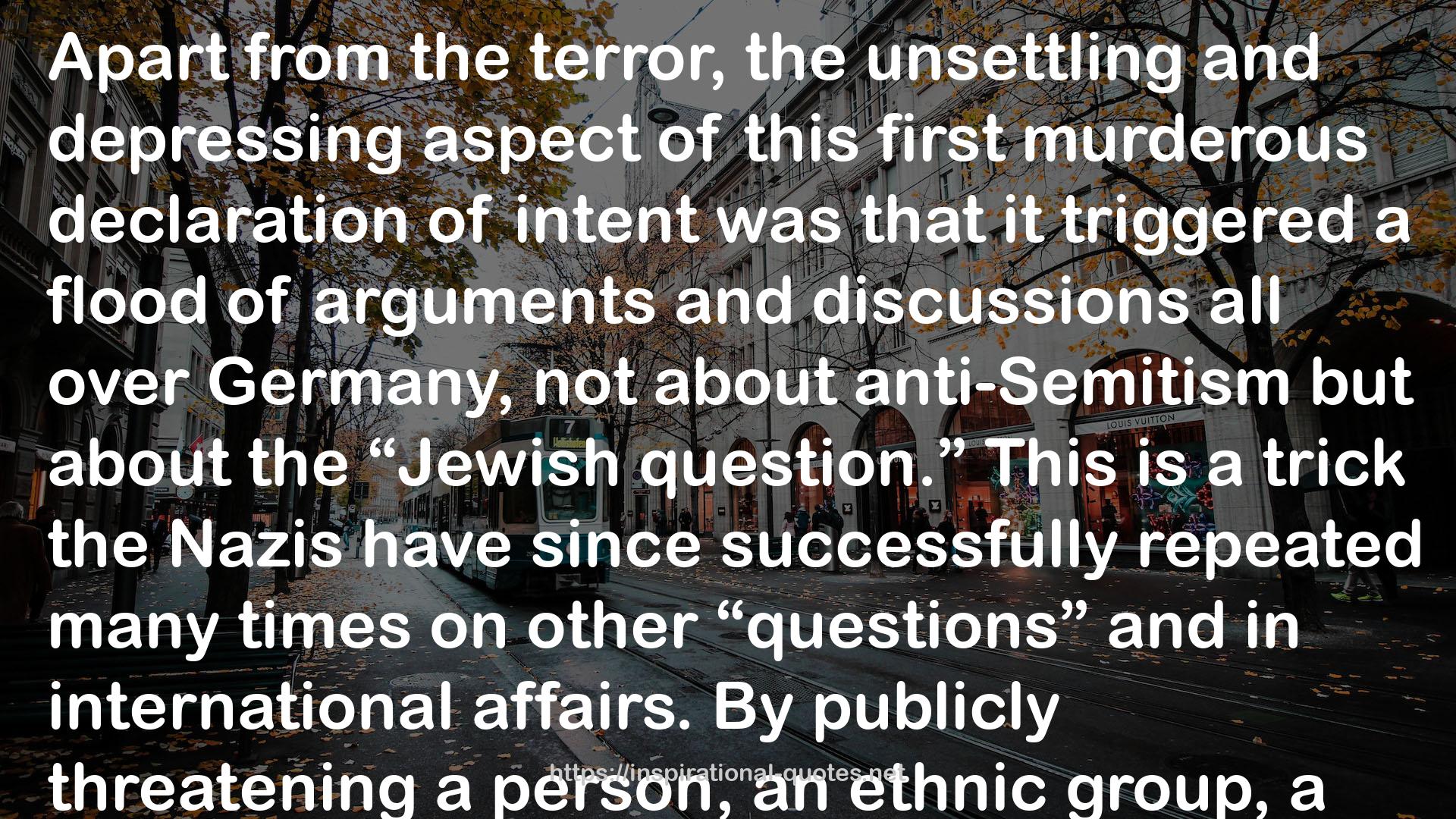23
" Clearly historical events have varying degrees of intensity. Some may almost fail to impinge on true reality, that is, on the central, most personal part of a person's life. Others can wreak such havoc there that nothing is left standing. The usual way in which history is written fails to reveal this. '1890: Wilhelm II dismisses Bismark.' Certainly a key event in German history, but scarcely an event at all in the biography of any German outside its small circle of protagonists. Life went on as before. No family was torn apart, no friendship broke up, no one fled their country. Not even a rendezvous was missed or an opera performance cancelled. Those in love, whether happily or not, remained so; the poor remained poor and the rich rich. Now compare that with '1933: Hindenburg sends for Hitler.' An earthquake shatters sixty - six million lives.
Official academic history has nothing to tell us about the differences in intensity of historical occurrences. To learn about that, you must read biographies, not those of statesmen but the all too rare ones of unknown individuals. There you will see that one historical event passes over the private (real) lives of people like a cloud over a lake. Nothing stirs, there is only a fleeting shadow. Another event whips up the lake as if in a thunderstorm. For a while it is scarcely recognisable. A third may, perhaps, drain the lake completely. I believe history is misunderstood if this aspect is forgotton (and it is usually forgotton). "
― Sebastian Haffner , Defying Hitler
25
" Al margen de dicha clase social culta, el gran riesgo que siempre corre la vida en Alemania es y será el vacío y el aburrimiento (tal vez a excepción de ciertas regiones geográficas fronterizas como Baviera o Renania, en las que algo del Sur, de romanticismo y de humor forman parte del paisaje). En las grandes extensiones de la zona norte y este de Alemania, en sus ciudades descoloridas, tras sus negocios y organizaciones gestionadas con tesón, exactitud y sentido del deber acecha y acechará siempre la ignorancia y, al mismo tiempo, el horror vacui y el deseo de «salvación»: una salvación a través del alcohol, de la superstición o, en el mejor de los casos, de un gran estado de embriaguez masiva que lo inunde todo. "
― Sebastian Haffner , Defying Hitler
28
" La traición fue total, generalizada y sin excepciones, desde la izquierda hasta la derecha. Ya he contado cómo los comunistas, ocultos tras la ostentosa fachada de su «disposición a intervenir» y de la preparación de una guerra civil, lo único que hicieron en realidad fue preparar la huida a tiempo de sus más altos funcionarios en dirección al extranjero. En lo que respecta a los líderes socialdemócratas, su traición a millones de pequeños ciudadanos decentes, partidarios fieles y ciegamente leales, ya había comenzado el 20 de julio de 1932, cuando Severing y Grzesinski «cedieron a la violencia». Asimismo, los socialdemócratas llevaron a cabo la campaña electoral de 1933 de una forma en extremo humillante, dejándose arrastrar por los eslóganes nazis y subrayando su condición de «también-nosotros-somos-nacionalistas». El 4 de marzo, un día antes de las elecciones, Otto Braun, presidente de Prusia y «hombre fuerte» de los socialdemócratas, cruzó la frontera suiza; había tomado la precaución de adquirir una casita en Tessin. En mayo, un mes antes de su disolución, los socialdemócratas llegaron al punto de prestar un apoyo unánime al gobierno de Hitler y de entonar el himno de Horst Wessel en el Reichstag (en el informe parlamentario figura la siguiente observación: «Ovaciones interminables y aplausos en la cámara y en las tribunas. El canciller del Reich también aplaude vuelto hacia los socialdemócratas»). "
― Sebastian Haffner , Defying Hitler
37
" El caso es que yo en modo alguno me consideraba nacionalista. El nacionalismo de club deportivo que imperó durante la guerra mundial y que hoy alimenta el espíritu de los nazis, la alegría ávida e infantil que supone el hecho de ver el propio país representado en el mapa como una mancha de color cada vez más y más grande, la sensación de triunfo por las «victorias» conseguidas, el placer ante la humillación y el sometimiento ajenos, el gozoso paladeo del temor que uno inspira, el autobombo nacional al estilo de los «maestros cantores», la manipulación onanista en torno al pensamiento «alemán», al sentimiento «alemán», a la lealtad «alemana», el hombre «alemán», «¡sé alemán!»... hacía tiempo que todo eso me parecía simplemente asqueroso y repugnante, no había nada a lo me viese obligado a renunciar. "
― Sebastian Haffner , Defying Hitler
38
" Yo no «amo» a Alemania, del mismo modo que no me «amo» a mí mismo. Si hay un país al que ame, ése es Francia, pero también podría querer a cualquier otra nación con más facilidad que a la mía propia, aunque no existieran los nazis. Sin embargo, el país de uno desempeña un papel muy distinto y mucho más insustituible que el de la nación amada, puesto que es precisamente eso: el propio país. Si se pierde, casi se pierde también el derecho a amar a otra nación. Desaparecen todas las condiciones que hacen posible ese hermoso juego de la hospitalidad nacional, es decir, del intercambio, de las invitaciones recíprocas, del aprender a entender al otro, de enorgullecerse ante el otro; en tal caso uno se convierte sin más en un «sans-patrie», en un hombre sin sombra, "
― Sebastian Haffner , Defying Hitler

